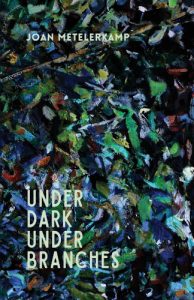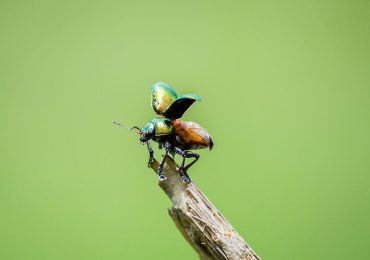The JRB presents an excerpt from Under dark under branches, the new poetry collection by Joan Metelerkamp.

Under dark under branches
Joan Metelerkamp
Deep South, 2024
~~~
I am four—
looking up at the black of the leaves
against the sun running like water
over his pram is it I or he my baby brother
who is seeing—
even then look up at the plane I am four
does he see this light this shadow
under branches under leaves free
wheeling patterns against the light—
blind wonder of light patterns of black
*
Through plantations across the river
can feet recall can smell
sight remember
or is it only the black and white photograph
burnt now gone burnt into the inner retina
remembered dappled-skinned children
fixing in the way of memory
an after-image like the bruise of love—
close second brother and I
running through the pines without any clothes
over resinous needles and cones
wolf children we knew
our mother’s myths and legends
sharp-faced azure-eyed wolves
we knew were continents ages away—
free feral kids filtered through shadows of tall trunks
hot breath resin the fall of drumming feet
calling out to each other
like birds wild children free of any words
swishing swashbuckling sticks—
at last the cleft fringe of bush where the stream
cleared its cleave over the stones and into its cool
falling streaming to its own clear cool
*
There that page is torn out
old stories done
gone into nothing
but memory and cousin-at-one-remove remembered
hearsay
burnt all the old photographs
letters piles in cardboard files
carbon copies shored up with all the old originals
little hand written letters folios of type
in the old jongmanskas that stood on the stoep
also ash done now gone in the fire that took them all out—
old images still old thoughts like lack of faith
repeat themselves still
firing neurons along the old habitual pathways
like under the diaphragm burning the solar plexus—
little ways of thinking little ways of holding—
can’t douse the old thoughts again and again can’t stand aside
get out of my own way recover—
placed the desk under the window
here in this still new-to-me country
under the pussy willow’s shelter the hawthorn’s
little-leafed indifference
old stories like old habits like old skin
peeled away peeling along the old cracks
revealing the tender place
ways of holding still from that other place—
little footsteps little bare feet over the grass
stopped for a moment waiting
and running then running down the hard dirt road
soft feet from another time and another place
freely through the reeds
across the clay the little weir at the wall at the dam
the Amanzimnyama the black water
running to get away from the sign
the sign in the long grass they said said
trespassers as I understood would be executed—
south west this summer of this north comes
with the cool clarity of a childhood autumn
under the hills Endebeni quiet and clarity
of a Sunday sick all the rest
gone off to the river and only you and your mother
*
- Joan Metelerkamp grew up in KwaZulu-Natal. After university studies in English and Drama she worked in educational theatre and taught English at the universities of the Western Cape and KwaZulu-Natal. For twenty years she lived on a family farm outside Knysna with her husband and two children. In 2016 she moved to Devon, England, where she trained to be a teacher of the Alexander Technique. She now lives with her daughter and her family in Massachusetts, United States.
~~~
Publisher information
Under dark under branches, Joan Metelerkamp’s tenth collection, continues the explorations of her recent book-length poems, opening out to five generations of family history and to the wider context of national history.
The assured music of the writing carries dialogues, lyrical passages, and fragments of narrative. Five years after leaving South Africa, the poet mourns the torn-out roots of her life—her community, environment and ancestors left behind in a country no longer her home.





